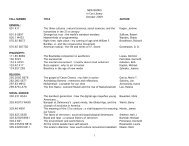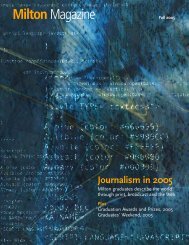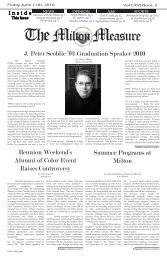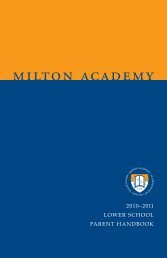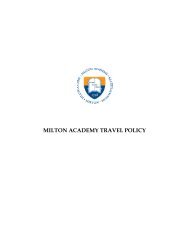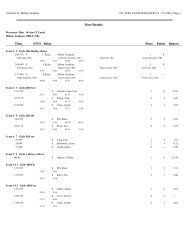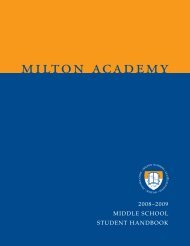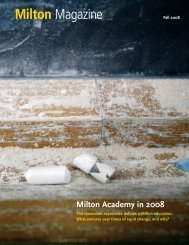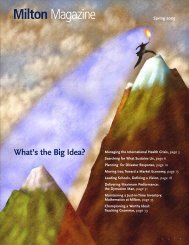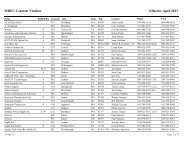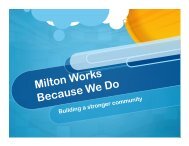Spring 2007 - Milton Academy
Spring 2007 - Milton Academy
Spring 2007 - Milton Academy
- No tags were found...
Create successful ePaper yourself
Turn your PDF publications into a flip-book with our unique Google optimized e-Paper software.
Yeng Felipe Butler ’92“Business for Social Responsibility helps companiesdevelop responsible business practices.We proactively work with our member companieson a diverse set of issues related to corporatesocial responsibility; How do we do this?We encourage cross-sector collaborationbetween business and civil society. ObviouslyI’d rather work with companies that try tointegrate these practices with overall corporatestrategies, rather than with those for whomthese are simply a part of PR strategy.”Business for Social Responsibility (BSR)today is a unique hybrid organization thatevolved in the early ’90s out of an advocacyorganization started by former StrideRite CEO Arnold Hiatt, who has longargued in numerous public pulpits that“the well-being of business cannot be separatedfrom the well-being of the communityand the nation.”Global trade has brought many multinationalcorporations to the realization thatto sustain business growth they have topay attention to the environment, economicdevelopment and human rights. Mainstreambusiness must worry about theimpact of problems such as climatechange, access to clean water, reducingconflict and promoting the rule of law.“BSR is a membership organization,” Yengexplains, “with a consulting practice and aresearch and development group.” Companiesfrom several sectors in particular joinBSR: consumer goods; information andcommunication technology; energy andmining; pharmaceuticals and biotechnology;food and agriculture; transportation. AsYeng notes, these sectors are heavily scrutinizedby media, investors and the public.They look to BSR for help, for instance,with stakeholder engagement to furtherinform their decision-making process. Inturn, BSR helps them map out a plan andthen implement it. “One of our recentprojects involved a large U.S.–based agriculturalcompany thinking about sourcingbananas from Africa,” says Yeng. “We’rehelping them identify the various risksrelated to this possible business venture—and that includes defining sustainablepractices, relaying and teaching theserequirements to the growers, as well asmonitoring their progress.”Members (AstraZeneca, Chevron, CiscoSystems, IKEA International, Intel andUnited Parcel Service, are examples) getissue expertise, consultative help, trainingand up-to-date research on trends andinnovations. BSR has, for instance, justpublished a Report on Corporate ClimateStrategy, reviewing a range of businessreactions to climate change.Perhaps most important, BSR membersconnect with a network: industry peers,partners, stakeholders and thought leadersinterested in dealing with the environmentalchallenges and social inequities that areunsustainable.What are socially responsible businesspractices? Can they be defined, measuredand reported? “That’s a hot debate,” Yengsays. “It’s hard to apply metrics to workthat is qualitative, and the link betweenusing socially and environmentally responsiblepractices and the bottom line hasn’tbeen firmly established yet.” The BSR Website announces that social research analystsfrom 23 investment firms havereleased a brief that explains how companies“can use the Global ReportingInitiative (GRI) to increase the credibility,comparability and utility of social and environmentalreporting.” “Reliable and commonlyused metrics are important,” Yengsays. “They’re part of how companiesshould be reviewed by investors, investorswho look at a triple bottom line: economicimpact, environmental impact, and socialimpact.”Yeng’s next project for BSR will be leadingtheir own first corporate social responsibility(CSR) report. She will need to help theorganization come up with the right metrics,take a close internal look at what isworking and what isn’t, and measure howthey model what they promote. There aregood examples of CSR reporting, done bypeer organization, Accountability, and inother sectors by British Telecommunications,GE, Shell, and Starbucks. “The BTreport is best in class,” Yeng says, “forcorrelating internal strategy with CSRpractices.”Last November, Yeng managed the annualBSR conference in New York—the largestforum for corporate social responsibilitypractitioners. More than 1,000 businessleaders came from more than 50 countriesand joined colleagues in the independentand public sectors. She took on directingthe conference, having only joined BSRthe previous summer. Arnold Hiatt, infact, was the person who suggested thatworking at BSR would give Yeng the experienceshe was seeking—learning the practicesof a top-rate nonprofit organization.When she spoke with Arnold, Yeng hadcompleted a mid-career master’s programin public administration from the KennedySchool at Harvard. While at Harvard, Yengwas interested in social entrepreneurshipand public and private sector partnerships.She helped found a nonprofit that set upbusiness-plan competitions to increase thenumber and quality of new business venturesin developing countries. Her nonprofit,Global Entrepreneurship Network(GEN), awards prizes to the most innovativeideas, that is, those with significantL E A D E R S H I PCollaborationaims at corporate social responsibility6 <strong>Milton</strong> Magazine



